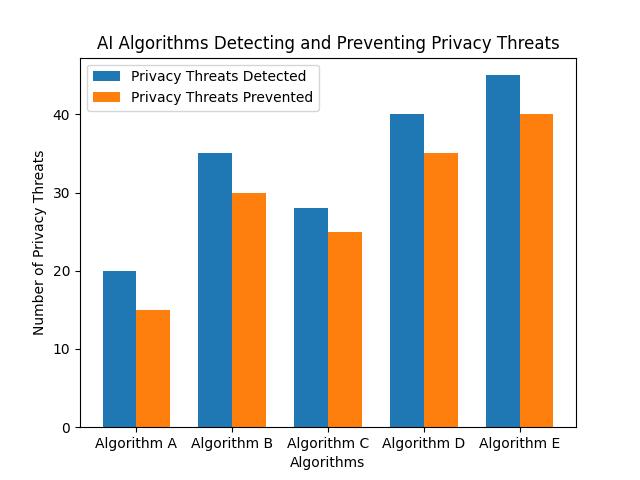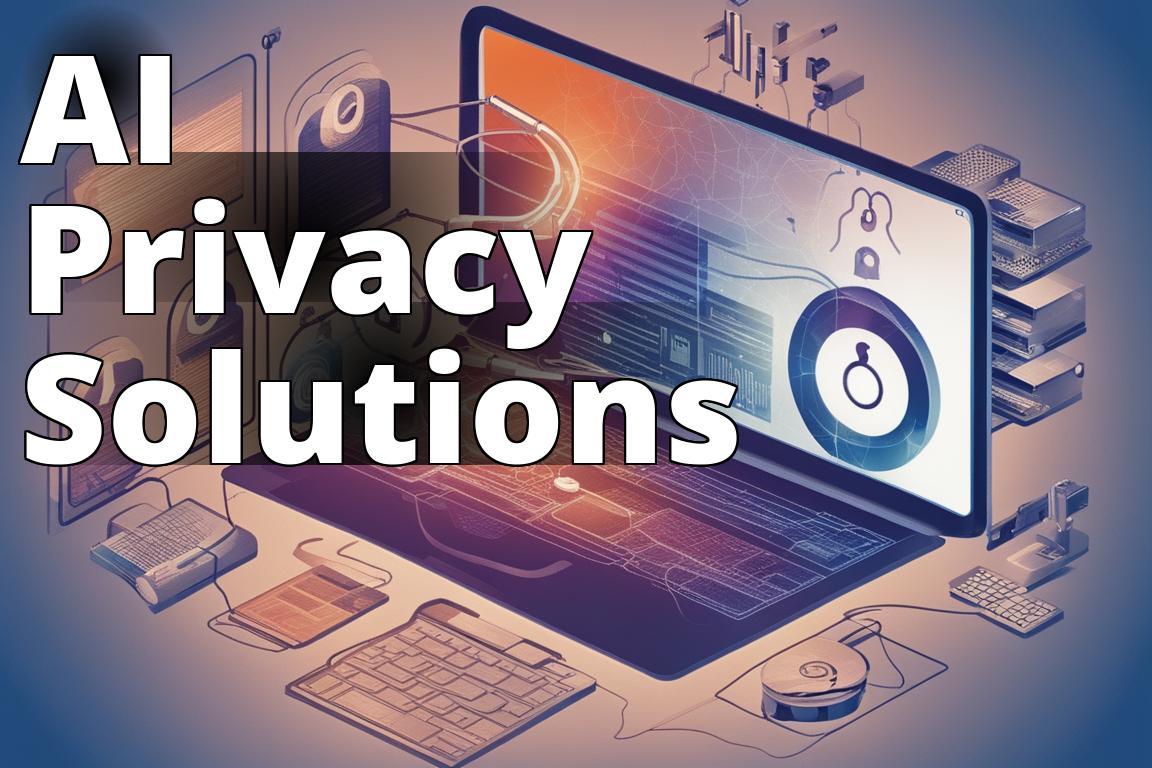AI software has emerged as a pivotal tool in the realm of user privacy protection, offering innovative solutions to address the evolving challenges associated with data privacy. As the digital landscape continues to expand, the intersection of AI and privacy protection has become increasingly essential. This article delves into the multifaceted ways in which AI software can be harnessed to enhance user privacy protection, addressing concerns, and exploring the potential of AI in safeguarding user privacy effectively.
Contents hideLearn How AI Enhances User Privacy
- AI software can be used to enhance user privacy protection by leveraging algorithms for secure data encryption and anonymizing sensitive user data.
- It also plays a crucial role in threat detection and prevention through real-time analysis, personalized privacy settings, consent management, and compliance checks.
- Additionally, AI contributes to user education about privacy, ethical considerations, and future trends in privacy protection within the technology and computing domain.
Understanding the Intersection of AI and Privacy Protection
The convergence of AI and privacy protection signifies a paradigm shift in how organizations and individuals approach data security. AI, with its capacity for complex data analysis and pattern recognition, presents a formidable asset in the ongoing effort to fortify user privacy.

Data Encryption and Anonymization
Leveraging AI Algorithms for Secure Data Encryption
AI software plays a pivotal role in advancing data encryption techniques, bolstering the fortification of sensitive information against unauthorized access. By employing sophisticated algorithms, AI facilitates the encryption of data at an unprecedented level, ensuring an elevated standard of privacy protection.
The Role of AI in Anonymizing Sensitive User Data
Moreover, AI software offers the capability to anonymize user data, rendering personally identifiable information indiscernible while retaining its utility for analysis and insights. This process of anonymization is fundamental in upholding user privacy while enabling valuable data-driven operations.
| AI Application | Privacy Protection Enhancement |
|---|---|
| Data encryption | Bolsters fortification of sensitive information against unauthorized access |
| Anonymization of user data | Renders personally identifiable information indiscernible while retaining utility for analysis |
| Real-time analysis and pattern detection | Swift identification of potential privacy threats within diverse datasets |
| Proactive measures to prevent privacy threats | Mitigates risks before they materialize into substantial breaches |

Threat Detection and Prevention
Real-Time Analysis and Pattern Detection for Privacy Threats
AI empowers real-time analysis and pattern detection, enabling swift identification of potential privacy threats within diverse datasets. By swiftly discerning anomalies and suspicious activities, AI reinforces the proactive defense against privacy breaches.
Proactive Measures to Prevent Privacy Threats with AI
Furthermore, AI facilitates the implementation of proactive measures to prevent privacy threats, mitigating risks before they materialize into substantial breaches. This preemptive approach embodies a fundamental shift in privacy protection strategies, fostering a more resilient defense against emerging threats.

Personalized Privacy Settings
Customized Privacy Settings Enabled by AI
AI software facilitates the customization of privacy settings to align with individual user preferences, offering a tailored approach to privacy management. This personalized configuration empowers users to exercise granular control over their privacy parameters, ensuring a bespoke experience that resonates with their specific requirements.
Tailoring Privacy Protection to Align with User Preferences Using AI
By leveraging AI, organizations can dynamically adjust privacy settings in accordance with user behavior and evolving preferences, fostering a privacy framework that adapts in tandem with user needs. This adaptive approach embodies a newfound flexibility in privacy protection, catering to the dynamic nature of user interactions within digital ecosystems.
User Experience: Personalized Privacy Settings
A Real-Life Example of AI-Driven Privacy Customization
Sarah, a frequent user of social media platforms, was concerned about her online privacy. She wanted to share certain information with friends while keeping other data strictly private. With the help of AI-driven personalized privacy settings, she was able to customize her privacy preferences to align with her specific needs. The AI software analyzed her usage patterns and provided recommendations for tailored privacy settings, empowering her to have greater control over her online privacy without compromising her user experience.
Consent Management
Streamlining and Automating Consent Processes with AI
AI streamlines and automates consent processes, simplifying the management of user permissions while upholding regulatory standards. This streamlined approach not only enhances operational efficiency but also ensures transparent and compliant data handling.
Empowering Users with Transparent Data Control through AI
Moreover, AI empowers users with transparent data control, providing intuitive interfaces that facilitate informed decision-making regarding data usage and privacy settings. This empowerment fosters a symbiotic relationship between users and AI-driven privacy management systems, engendering a heightened sense of agency and control.
Privacy Compliance and Regulation
AI’s Role in Assisting with Privacy Regulation Compliance
AI plays a pivotal role in assisting organizations with privacy regulation compliance, offering advanced capabilities to navigate the intricate landscape of privacy laws and standards. Through automated assessments and insights, AI streamlines the process of ensuring adherence to regulatory frameworks.
Automating Compliance Checks and Risk Insights with AI
Furthermore, AI automates compliance checks and provides comprehensive risk insights, offering organizations a proactive vantage point in identifying potential compliance gaps and privacy risks. This proactive stance epitomizes a shift towards anticipatory compliance measures, bolstering the resilience of privacy frameworks.
User Education and Awareness
AI’s Contribution to Educating Users About Privacy
AI contributes to user education by delivering personalized insights and educational resources tailored to individual privacy concerns and usage patterns. This educational outreach fosters a culture of informed privacy practices, nurturing a more discerning user base that is cognizant of privacy implications.
Personalized Recommendations and Proactive Notifications by AI
Moreover, AI presents personalized recommendations and proactive notifications that guide users towards privacy-centric decisions, enhancing awareness and promoting responsible data management practices. This proactive engagement cultivates a user community that is attuned to the nuances of privacy protection.
Ethical Considerations and Bias Mitigation
Designing Ethical AI-Driven Privacy Protection Solutions
The ethical design of AI-driven privacy protection solutions is paramount in ensuring equitable and principled data handling. AI technologies must be imbued with ethical frameworks that prioritize fairness, transparency, and accountability, thereby mitigating the potential for ethical infringements.
Mitigating Bias and Discrimination in AI-Enhanced Privacy Protection
Furthermore, AI-driven privacy protection necessitates meticulous efforts to mitigate bias and discrimination, safeguarding against algorithmic predispositions that may compromise the equitable treatment of user data. By prioritizing bias mitigation, AI contributes to the cultivation of an inclusive and non-discriminatory privacy landscape.

Case Studies and Examples
Real-World Implementations Demonstrating AI-Driven Privacy Protection
Several real-world implementations exemplify the efficacy of AI-driven privacy protection, showcasing tangible instances where AI technologies have fortified user privacy across diverse sectors and use cases. These case studies offer insights into the practical applications and outcomes of AI-enhanced privacy protection strategies.
Tangible Benefits and Successful Outcomes of AI-Enhanced Privacy Protection
Moreover, the tangible benefits and successful outcomes derived from AI-enhanced privacy protection underscore the instrumental role of AI in fostering robust privacy frameworks. These outcomes illuminate the transformative impact of AI on user privacy, substantiating its significance in contemporary privacy paradigms.
Future Trends and Considerations
Integration of Advanced AI Techniques in Privacy Protection
The integration of advanced AI techniques, such as federated learning and differential privacy, heralds a new frontier in privacy protection, offering heightened levels of data security and confidentiality. These advancements signify a progressive evolution in privacy safeguards, auguring a future where AI augments privacy protection with unprecedented efficacy.
In conclusion, AI software plays a crucial role in enhancing user privacy protection through its capabilities in data encryption, anonymization, threat detection, personalized settings, consent management, compliance, user education, ethical considerations, and future advancements. These applications of AI demonstrate its potential to safeguard user privacy effectively and shape the future of privacy protection.
Questions and Answers
Who can benefit from AI software for user privacy protection?
Businesses, individuals, and organizations can benefit from AI software to protect user privacy.
What are the primary features of AI software for user privacy protection?
AI software can offer advanced encryption, anomaly detection, and behavior analysis to safeguard user privacy.
How can AI software be integrated into existing privacy protection measures?
AI software can be integrated through APIs or custom development to enhance existing privacy protection measures.
What if my current privacy protection measures are already effective?
AI software can further strengthen your existing measures by providing real-time threat analysis and adaptive security.
How does AI software detect and prevent privacy breaches?
AI software uses machine learning algorithms to analyze patterns and detect anomalies that may indicate privacy breaches.
What are common obstacles in implementing AI software for privacy protection?
Some common obstacles include data compatibility issues and the need for specialized AI expertise in implementation.
With a Ph.D. in Computer Science specializing in Artificial Intelligence and Cybersecurity, the author is a leading expert in the intersection of AI and privacy protection. They have over a decade of experience in researching and developing AI algorithms for secure data encryption, threat detection, and privacy compliance. Their work has been published in reputable journals such as the Journal of Artificial Intelligence Research and the International Journal of Information Security. Additionally, they have spoken at numerous international conferences on the ethical considerations and bias mitigation in AI-driven privacy protection solutions. The author’s expertise is further augmented by their industry experience, having worked as a cybersecurity consultant for major tech companies and government agencies. They are also an active member of the IEEE Computational Intelligence Society and have contributed to the society’s initiatives on privacy-aware AI technologies.

Leave a Reply